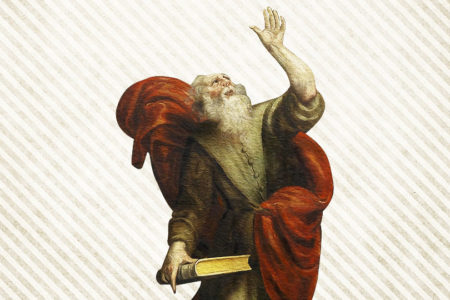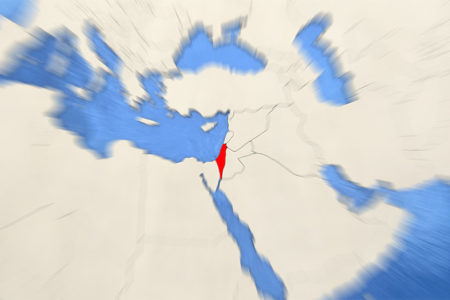The Power Behind the Throne
God’s Pronouncement and Revelation Concerning the King of Tyre. Ezekiel 28:1–19
From the time God created the world, Satan has wanted to rule it. In ancient days, one of Satan’s strongholds was the Phoenician city-state of Tyre, which dates back to around 2700 BC. Four of God’s prophets condemned Tyre, but the prophet Ezekiel went a step further: He also addressed Satan, the mastermind who controls people and nations that hate God.
Tyre is first mentioned in the Bible as the inheritance of the tribe of Asher (Josh. 19:29), but Israel failed to conquer the area. A highly developed trade center situated on the Mediterranean Sea between Sidon in the north and Acre in the south, Tyre originally was located on Phoenicia’s mainland. But because of foreign invaders, the city was rebuilt on a rock island in the sea, making its destruction extremely difficult. Today the area is in Lebanon.
Tyre was so rich in commercial trade, timber, and skilled labor that King David asked the city’s King Hiram to provide cedar trees, carpenters, and masons to build him a house. Later, King Solomon did the same when he built the Temple in Jerusalem.
Tyre maintained a relationship with Israel even after the northern 10 tribes split from Judah. But Assyrian and Babylonian aggression severed Tyre’s ties with Israel, and they became enemies.
Many nations invaded the city-state but could not destroy it. The Assyrians invaded Tyre in the 10th century BC and managed to force it to pay tribute until the Babylonians destroyed the Assyrians in 612 BC. Babylonian King Nebuchadnezzar then besieged Tyre for 13 years (586–573 BC) but ended up signing a treaty. The Persians attacked, further weakening the city, but by 520 BC they severed relations with it.
Finally, in 332 BC, Alexander the Great captured Tyre after besieging it for seven months and building a causeway to the island. The city eventually was destroyed in the 13th century AD when Muslims captured it from the Crusaders.
Four prophets condemned Tyre: Isaiah, Ezekiel, Amos, and Zechariah. God gave Ezekiel four prophecies against the city, each beginning with “The word of the LORD came to me, saying” (Ezek. 26:1; cf. 27:1; 28:1, 11). The messages detail Tyre’s sinful trade practices, idolatry, sexual immorality, and pride. God pronounced judgment on the city and its ruler and called the prophet to lament over the nation’s coming demise.
PRIDE OF THE KING
The chief sin of the “prince [leader, ruler] of Tyre” was pride. He was so proud, in fact, he actually proclaimed himself to be “a god” (28:2).
Using great sarcasm, Ezekiel declared, “You are wiser than Daniel! There is no secret that can be hidden from you!” (v. 3). The prophet Daniel resided in Babylon, where God had highly elevated him and used him to speak divine wisdom to Nebuchadnezzar. However, Daniel never claimed to be wise on his own. He always proclaimed that all the wisdom he uttered came exclusively from the true and living God.
On the other hand, Tyre’s ruler thought himself a god because of his skill in accumulating massive wealth (vv. 4–5). God castigated him for his proud, arrogant self-glorification: “Yet you are a man, and not a god, though you set your heart as the heart of a god!” (v. 2).
PROPHECY AGAINST THE KING
The king was in for a rude awakening:
Therefore thus says the Lord GOD: “Because you have set your heart as the heart of a god, behold, therefore, I will bring strangers against you, the most terrible of the nations; and they shall draw their swords against the beauty of your wisdom, and defile your splendor. They shall throw you down into the Pit” (vv. 6–8).
The king’s arrogance, pride, and self-exaltation would precipitate the worst, most violent death possible for him and his kingdom. Strangers would obliterate his beauty, splendor, and wealth; and he would “‘die the death of the uncircumcised by the hand of aliens; for I have spoken,’ says the Lord GOD” (v. 10).
The Phoenicians practiced circumcision, as did the Israelites. To die “the death of the uncircumcised” meant to die in shame, dishonor, and contempt as a barbarian. His corpse would be treated with humiliation and disrespect and left unburied for vultures to devour.
POWER BEHIND THE KING
The Bible clearly teaches that Satan is the mastermind behind the enemies of God. This fact apparently was true of the king of Tyre and the city-state he ruled. God commanded Ezekiel to pronounce a prophetic lamentation against the king (vv. 11–12). Verses 12–13 have generated much debate over the years because the revelation transcends the human ruler:
- “You were the seal of perfection, full of wisdom and perfect in beauty” (v. 12).
- “You were in Eden, the garden of God; every precious stone was your covering” (v. 13).
- “The workmanship of your timbrels and pipes was prepared for you on the day you were created” (v. 13).
- “You were the anointed cherub; . . . you were on the holy mountain of God” (v. 14).
- “You were perfect in your ways from the day you were created” (v. 15).
Abruptly, a great contrast appears:
- “Till iniquity was found in you” (v. 15).
- “You became filled with violence within” (v. 16).
- “You sinned” (v. 16).
- “Your heart was lifted up because of your beauty” (v. 17).
- “You corrupted your wisdom for the sake of your splendor” (v. 17).
God also declared, “I cast you as a profane thing out of the mountain of God; and I destroyed you, O covering cherub, from the midst of the fiery stones” (v. 16).
Various interpretations of these verses have surfaced throughout the centuries. Some say they refer to a heathen god that energized the king to proclaim himself a god. Others believe Ezekiel was speaking of Adam (the ideal man) before his sin and expulsion from Eden. Still others believe the verses refer to the entire revelation of paradise in Genesis 3 before God judged Adam, Eve, and the serpent.
Another widely held belief is that Ezekiel used a well-known mythical Phoenician story to explain the king’s power and how he acquired such wealth. Some interpreters believe the chapter teaches the king of Tyre was actually possessed by Satan.
Finally, many view these verses as a dual prophecy, speaking about the king’s pride in comparison to Satan’s. These are only a few of the many interpretations.
People go to great lengths to try to tie this section to the earthly king. But they cannot explain the extraordinary language and details God revealed to Ezekiel. The king of Tyre (thought by many to be Ithobaal II or III) cannot be the one described here. Rather, God is pointing to someone who is the power behind the king and whose attributes transcend anything the king of Tyre ever possessed.
For example, the king was never “perfection” (Ezek. 28:12; cf. v. 15) “in Eden” (v. 13). He was never “the anointed cherub . . . on the holy mountain of God” (v. 14). Nor was he “created” (v. 15). The king was born, not created.
This passage and Isaiah 14:12–15, used in conjunction with the king of Babylon, reveal the origin of Satan’s creation and his original, angelic holy state; his disastrous sin and fall; his power; and his state today. It does not seem reasonable that Ezekiel was describing the characteristics or career of a human ruler, let alone the king of Tyre. Ezekiel closed this section of the chapter by telling of this individual’s pride, rebellion, violence, revolt, expulsion from the mountain of God to the earth, and final destiny (Ezek. 28:16–19).
The evil characters and their corrupt influence constantly shift back and forth from the ruler of Tyre (v. 2) to Satan himself (vv. 12–15), closely linking the two and indicating the king was satanically influenced and motivated.
Ezekiel’s words describe Lucifer’s evil nature and career before his fall—before his name was changed to Satan. This setting becomes the backdrop for the fall of the king of Tyre. Therefore, the power behind Tyre’s throne was none other than Satan himself.
Satan is the mastermind behind evil individuals and nations who hate God. This was true of the king of Tyre and the city-state he ruled. God’s judgment fell on the king as Ezekiel prophesied; and in God’s time, eternal judgment and perdition will fall on the power behind the king of Tyre, who is the Devil himself.








